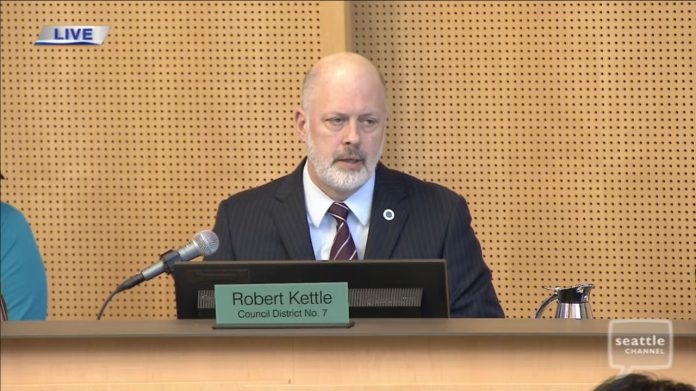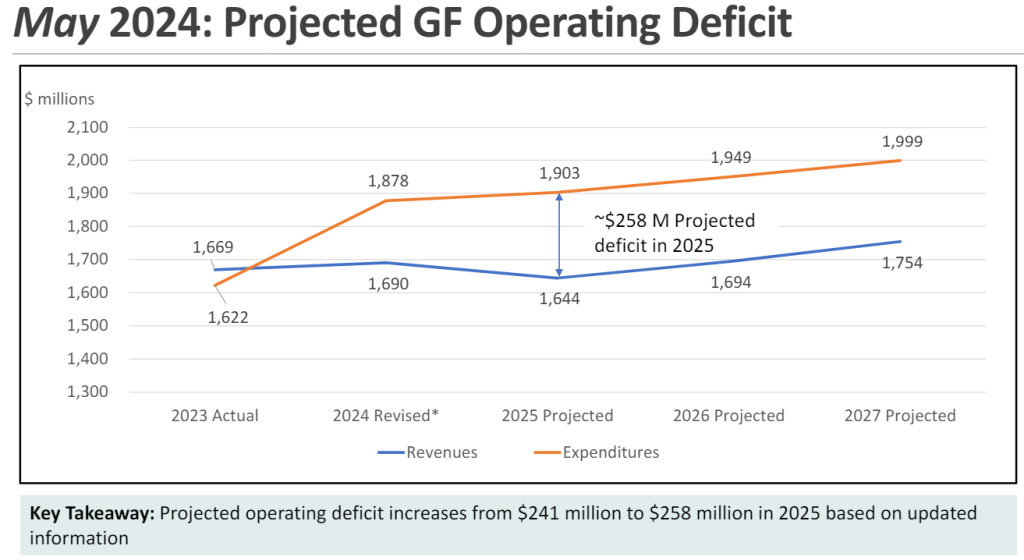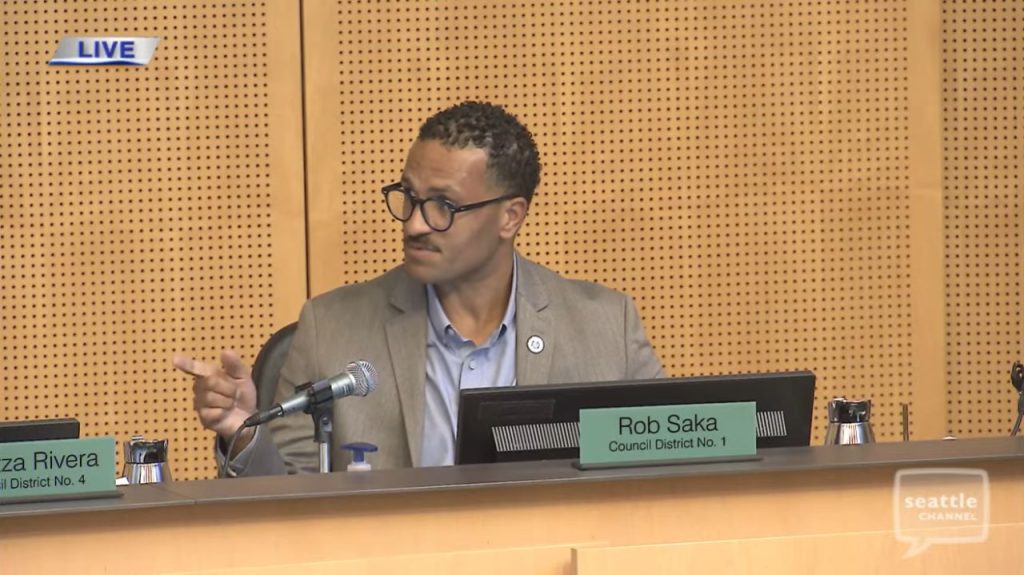
On Tuesday afternoon, the Seattle City Council voted 8-to-1 in favor of the new Seattle Police Officers Guild (SPOG) contract, with the sole dissenting vote from Councilmember Tammy Morales.
Per Central Staff director Ben Noble, this contract will provide a compounded 24% raise to SPOG members covering the period 2021-2023, costing the city $57.1 million in a one-time lump sum to cover backpay. The ongoing annual additional cost of the contract is $39.2 million. Adding together the backpay and greater pay commitments this year, the new contract will cost the City $96 million this year alone. Any raises for 2024 will be negotiated separately and require additional backpay.
Central Staff’s memo about the new contract, released last week, states that the total cost of this contract from 2021 to 2026 exceeds reserves and their previous forecast by $9.2 million, a sum that will need to be covered in this year’s mid-year supplemental budget. The memo speculates that this money will come from unspent resources in 2023 as well as savings from this year’s budget freeze, from which we are seeing impacts ranging from reduced library hours to short-staffed city departments.
“These additional costs will add to the $230+ million annual deficit that must be resolved in that budget,” the memo concludes.
Public Safety Chair Robert Kettle addressed the financial impacts of the contract during his comments at the Tuesday meeting, saying, “Yes, it is expensive. Yes, it is a challenge for our budget, but if we don’t compete in this labor market, we won’t accomplish our goal of achieving a safe base in our city.”
On Monday, a new staff presentation was released saying the estimated budget deficit for 2025 has grown from $241 million to $258 million due to settled labor contract costs that exceeded planning estimates.

According to SPD watchdog group Divest SPD’s estimates, SPD Officer Daniel Auderer, who was caught on footage laughing over the death of Jaahnavi Kandula, will be receiving around $60,000 for his backpay, and Officer Kevin Dave, who struck and killed Kandula, will be receiving around $53,000.
In return for this generous raise to SPOG members, the City is receiving a small number of minor accountability improvements, including arbitrators being required to give deference to the Police Chief on type and severity of discipline, minor adjustments to the 180-day investigative clock under which the Office of Police Accountability (OPA) currently labors, two additional civilian investigators for the OPA, and no longer requiring notice of a complaint be sent to an officer within five days.
However, these few changes fall far short of what police accountability advocates and the Community Police Commission have been asking for. When the last SPOG contract was passed in 2018, it failed to allow the 2017 Accountability Ordinance to be implemented. After a long six-year wait, this new contract also fails to pass this basic bar of accountability. Advocates will remain waiting on a whole laundry list of common sense improvements to accountability in Seattle.
There is also concern about what this contract will mean for Seattle’s ability to stand up a true alternative response to behavioral health crises. While councilmembers were quick to mention this contract’s civilianization components, language in the attached Memorandum of Understanding (MOU) puts stringent limits on what type of wellness calls the new Community Assisted Response and Engagement (CARE) team will be allowed to respond to, another restriction on an already underutilized program. Meanwhile, the 18 jobs outlined in the MOU that will now be allowed to be undertaken by civilians amount to providing what The Stranger’s Ashley Nerbovig has called “personal assistants to cops.”
“We will continue to have recruiting issues if departments on the other side of the lake have higher wages, and this agreement includes many important civilianization components,” Councilmember Dan Strauss said. “There is still more work to do between now and the final successor agreement to this interim contract.”
In his order explaining what the city needed to do to complete its commitments under the 2012 consent decree, U.S. District Judge James Robart wrote: “The court understands that collective bargaining between the City and the police unions is outside of the scope of its supervision of the Consent Decree. Nevertheless, in order to evaluate whether the City has achieved sustained compliance with those areas of the Consent Decree that remain open, it is critical for the court to understand whether and how the outcome of the collective bargaining process affects SPD’s accountability and review systems.”
Judge Robart specifically mentioned needing to know of any effect a new contract would have on implementation of the 2017 Accountability Ordinance and required the city to submit a report on any tentative contract, which it did on April 29.
Mayor Bruce Harrell seems to believe the new contract makes enough improvements to win Judge Robart’s approval, at least based on a recent interview with Cascade PBS. “I’m confident it will be enough to end the consent decree,” Harrell said.
At the Council Briefing on Monday, Morales asked Council President Sara Nelson to delay the final vote on the new contract, saying, “We haven’t had a single public hearing on this contract, and this contract with SPOG is a really important vote about the future of police accountability in the city and civilian public safety alternatives in the city. I really think the community deserves the chance to make their voice heard.”
However, Nelson said there was nothing irregular with the scheduling of the vote, and at the end of the meeting, she added that due to some idiosyncrasy of new HR software, to delay the vote for even one week would mean the stipulated backpay wouldn’t be able to be paid out until fall. This delay might give SPOG cause to file an unfair labor practice, which could cost the city more money. Why the city’s failure to manage their scheduling and software installation should impugn on the community’s ability to speak on a long-overdue and vastly important contract is unclear.
During the Council Meeting on Tuesday, Morales moved for the SPOG contract to be removed from the day’s agenda, but she failed to garner the support of her colleagues. In asking for more time for the public to understand and comment on the new contract, she said, “These are issues that the council cannot control: management of the department, setting the tone, and changing the culture are all issues that are the responsibility of the Chief and of the Executive. City Council’s job is to approve the budget and to ensure that the city is compliant with the law. This contract undermines our obligation to balance the budget and to ensure that our policing is constitutional.”

The contract that the Council passed is an interim or partial contract, which Councilmember Rob Saka called “a great first step.” A SPOG contract that would cover 2024 and might possibly provide additional accountability improvements has been in mediation since the end of last year. Should mediation fail, the contract would move to interest arbitration, where a final and binding decision would be reached.
Meanwhile, police accountability advocates are deeply disappointed. “I expected a massive price tag to come with any gains in accountability, but was honestly not prepared for how one-sided this agreement is,” tweeted Dr. Shannon Cheng, Chair of People Power Washington. “I would argue that the permissive environment that really needs to be changed is the one that the SPOG contract enables.”
Amy Sundberg is the publisher of Notes from the Emerald City, a weekly newsletter on Seattle politics and policy with a particular focus on public safety, police accountability, and the criminal legal system. She also writes science fiction, fantasy, and horror novels. She is particularly fond of Seattle’s parks, where she can often be found walking her little dog.

